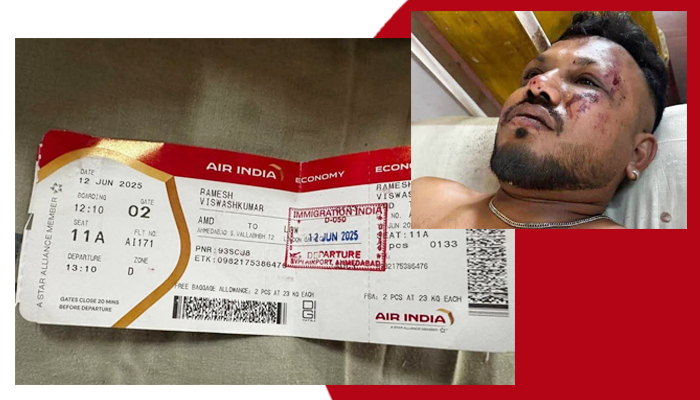
MUSCAT: In the wake of the devastating Air India crash in Ahmedabad on Thursday that claimed 271 lives — 241 on board and 30 in a medical hostel — stories of one man’s improbable survival have captured global attention.
Vishwash Kumar Ramesh, a 40-year-old British citizen of Indian origin, who was seated in 11A on Air India Flight AI171, emerged as the sole survivor of the disaster.
Now, in a wave of emotional response, travellers are increasingly choosing seat 11A when booking flights — not because it offers more legroom or a better view, but because it has come to represent something far more powerful: hope.
Rohit Kumar, a Muscat-based marketing professional, is one of them. He is scheduled to fly from Muscat to Kolkata on June 16 and has already locked in his seat of choice.
Speaking to Times of Oman, Kumar said: “I paid extra for seat 11A for my upcoming trip to my hometown. After watching the miracle in the Air India crash, I got a feeling that whenever I travel, I will book 11A. I am not sure if there is any science behind it, but what I saw on TV after that horror crash — I think I’ve made up my mind.”
The sole survivor in the Ahmedabad crash, Vishwash Kumar Ramesh was seated in seat 11A, near an emergency exit, and miraculously escaped through the emergency door shortly after the aircraft crashed into a medical hostel soon after takeoff.
Shocked and injured, Ramesh, who is now recovering in a hospital was traveling with his brother Ajay (now declared dead), was able to unbuckle himself, push through the opening, and crawl away to safety. He later recounted witnessing bodies around him as he fled the wreckage.
Vimla, a homemaker based in Muscat, is planning her annual visit to India in July. She too has made a special request to her husband to secure seat 11A.
In her comments to Times of Oman, she said: “I’ve told my husband to ask the travel agent to book 11A. I know these things don’t always make sense logically, but what we saw on TV — the way that one passenger emerged alive — gives us hope that miracles do happen.”
She added: “Even though seat layouts change from flight to flight, I just want to book 11A. It symbolises something positive in an otherwise dark event.”
Surge in seat requests
Airline staff and travel agents have noted a modest but noticeable increase in passengers specifically requesting 11A, a seat that was previously seen as just another window option in the forward economy cabin.
On travel forums and social media, screenshots of boarding passes marked “11A” are being shared with captions like “miracle seat” or “chosen one.”
For some, it’s a show of faith; for others, its part tribute, and part talisman.
Despite the wave of emotional attachment to 11A, aviation experts and safety professionals are cautioning against placing too much belief in the idea of a “safe seat.”
“There is no hard and fast rule that any particular seat — including 11A — offers greater safety in the event of a crash,” said a retired commercial pilot on a social media platform.
Indeed, historical crash data shows no consistent pattern in terms of seat-based survivability. While some studies suggest rear seats may offer slightly higher survival rates in certain crash scenarios, experts stress that no conclusions should be generalised.
Behavioural psychologists believe the fixation on seat 11A stems from a human tendency to seek control and meaning in the face of disaster.
“People want something to hold on to — a symbol, a ritual, a belief — especially when logic and reason can’t explain how one person survived and so many others didn’t,” said Dr. Preeti Jain, a psychologist based in New Delhi, India
“For some, choosing 11A is not about superstition; it’s about emotional comfort,” she added.
While airlines aren’t endorsing or discouraging such seat choices, the phenomenon reflects a deeper truth about modern air travel — that even in the age of science and safety, emotion and symbolism still fly with us.